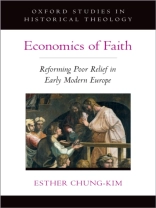Economics of Faith examines the role of religious leaders in the development of poor relief institutions in early modern Europe. As preachers, policy makers, advocates, and community leaders, these reformers offered a new interpretation of salvation and good works that provided the religious foundation for poor relief reform. Although poverty was once associated with the religious image of piety, reformers no longer saw it as a spiritual virtue. Rather they considered social welfare reform to be an integral part of religious reform and worked to modify existing poor relief institutions or to set up new ones. Population growth, economic crises, and migration in early modern Europe caused poverty and begging to be an ever-increasing concern, and religious leaders encouraged the development and expansion of poor relief institutions. This new cadre of reformers served as catalysts, organizers, stabilizers, and consolidators of strategies to alleviate poverty, the most glaring social problem of early modern society. Although different roles emerged from varying relationships and negotiations with local political authorities and city councils, reform-minded ministers and lay leaders shaped a variety of institutions to address the problem of poverty and to promote social and communal responsibility. As religious options multiplied within Christianity, one’s understanding of community determined the boundaries, albeit contested and sometimes fluid, of responsible poor relief. This goal of communal care would be especially relevant for religious refugees who as foreigners and strangers became responsible for caring for their own group.
Esther Chung-Kim
Economics of Faith [EPUB ebook]
Reforming Poverty in Early Modern Europe
Economics of Faith [EPUB ebook]
Reforming Poverty in Early Modern Europe
购买此电子书可免费获赠一本!
语言 英语 ● 格式 EPUB ● ISBN 9780197537756 ● 出版者 Oxford University Press ● 发布时间 2021 ● 下载 3 时 ● 货币 EUR ● ID 8324907 ● 复制保护 Adobe DRM
需要具备DRM功能的电子书阅读器











